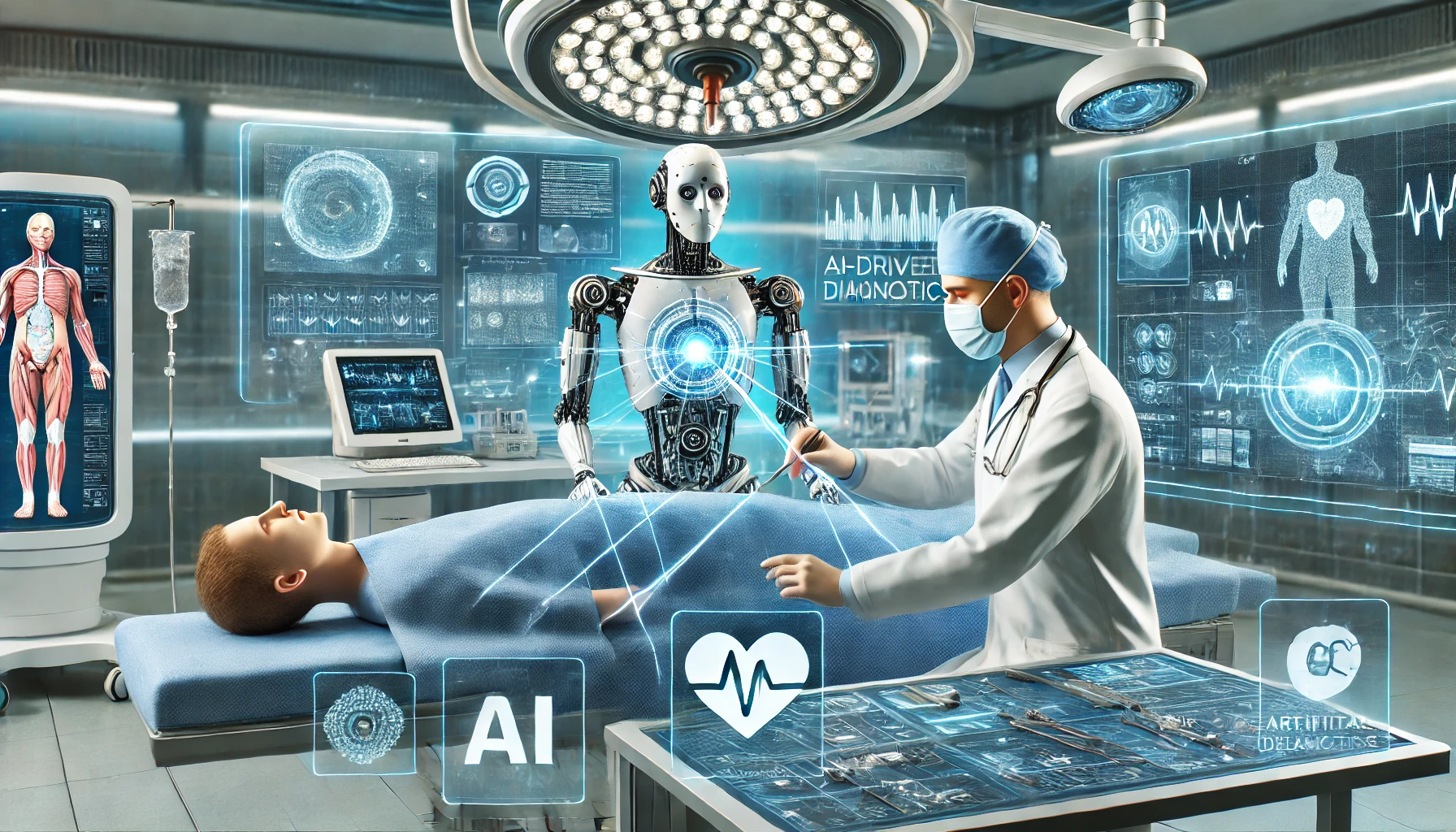Artificial Intelligence (AI) is revolutionizing healthcare by improving diagnostics, treatment planning, patient care, and operational efficiency. From disease detection to robotic-assisted surgeries, AI is making medical processes faster, more accurate, and accessible. This article explores the key ways AI is transforming healthcare in 2025.
1. AI-Powered Diagnostics: Detecting Diseases Earlier and More Accurately
One of the biggest advancements in AI-driven healthcare is its ability to detect diseases at earlier stages with higher precision. AI algorithms analyze medical images, blood tests, and genetic data to diagnose conditions that might be missed by human doctors.
- Medical Imaging Analysis: AI-powered imaging systems scan X-rays, MRIs, and CT scans to detect diseases like cancer, fractures, and neurological disorders with near-perfect accuracy.
- AI in Pathology: Machine learning models analyze biopsy samples at a microscopic level, identifying cancerous cells faster and more accurately than traditional methods.
- Predictive Analytics: AI can predict a patient’s risk of developing conditions like heart disease, diabetes, and Alzheimer’s by analyzing medical history and lifestyle factors.
💡 Example: Google’s DeepMind developed an AI system that detects breast cancer better than human radiologists, reducing false positives and negatives.
2. AI in Drug Discovery and Development
Traditional drug development takes years and billions of dollars. AI accelerates this process by identifying potential drug compounds and predicting their effectiveness.
- AI-Driven Drug Design: AI models analyze vast chemical datasets to suggest new drug molecules with high success potential.
- Repurposing Existing Drugs: AI scans databases of FDA-approved drugs to find new treatments for diseases like COVID-19 and rare genetic disorders.
- AI in Clinical Trials: AI helps recruit ideal patients for clinical trials, reducing costs and increasing success rates.
💡 Example: In 2023, AI helped develop an antibiotic for drug-resistant bacteria in record time, saving lives and improving treatment strategies.
3. Robotic-Assisted Surgeries: Precision and Safety
AI-powered robotic systems are assisting surgeons in performing minimally invasive surgeries with extreme precision.
- Steadier Hands: Robots eliminate human hand tremors, allowing for delicate procedures in neurosurgery and heart surgery.
- Real-Time AI Assistance: AI provides live recommendations during surgery by analyzing imaging data and guiding surgeons.
- Remote Surgeries: In some cases, AI-powered robotic systems allow doctors to perform surgeries from thousands of miles away using robotic arms controlled remotely.
💡 Example: The da Vinci Surgical System, powered by AI, is already performing complex surgeries with microscopic precision.
4. AI in Personalized Medicine: Tailored Treatments for Every Patient
AI is making medicine more personalized by analyzing a patient’s genetic makeup, lifestyle, and medical history.
- Customized Cancer Treatments: AI helps oncologists design individualized treatment plans based on a patient’s genetic profile.
- AI-Optimized Medications: AI suggests the best drug combinations and dosages for patients, reducing side effects and improving outcomes.
- Real-Time Health Monitoring: Wearable AI devices track heart rate, glucose levels, and other vital signs, alerting doctors to potential health risks before they become emergencies.
💡 Example: IBM’s Watson AI analyzes cancer patients’ data and recommends customized treatments with a high success rate.
5. AI in Mental Health: Virtual Therapists and Emotional AI
AI is playing a crucial role in addressing mental health issues by providing accessible and affordable therapy options.
- AI Chatbots for Therapy: AI-powered mental health apps like Woebot and Wysa provide 24/7 emotional support and cognitive behavioral therapy.
- Speech and Facial Analysis: AI detects signs of depression and anxiety by analyzing a patient’s voice tone, facial expressions, and social media activity.
- Personalized Mental Health Plans: AI tailors therapy recommendations based on a patient’s psychological profile.
💡 Example: AI programs are now capable of detecting early signs of PTSD and depression through voice patterns, helping veterans and trauma survivors.
6. AI in Administrative Healthcare: Reducing Costs and Increasing Efficiency
AI is also improving the operational side of healthcare, reducing administrative burdens and cutting costs.
- AI-Powered Scheduling: AI streamlines hospital appointment bookings and reduces patient wait times.
- Automated Medical Billing: AI minimizes billing errors and fraud, ensuring patients and insurers are charged correctly.
- AI Chatbots for Patient Assistance: AI chatbots answer medical inquiries, schedule appointments, and provide medication reminders.
💡 Example: Hospitals using AI scheduling systems reduced patient wait times by 30% and increased efficiency.
7. The Ethical Challenges of AI in Healthcare
Despite its benefits, AI in healthcare presents several ethical challenges:
- Data Privacy Concerns: AI relies on vast amounts of patient data, raising concerns about security and consent.
- Bias in AI Models: AI systems can inherit biases from the data they’re trained on, leading to disparities in medical outcomes.
- Doctor vs. AI: While AI assists doctors, should it be trusted to make life-and-death decisions without human intervention?
💡 Solution: Governments and medical institutions are developing AI regulations to ensure ethical and safe AI applications in healthcare.
8. The Future of AI in Healthcare
Looking ahead, AI is expected to:
✅ Detect diseases even before symptoms appear using predictive analytics
✅ Improve robotic surgery precision and make surgeries less invasive
✅ Create AI-driven virtual hospitals, where patients consult AI doctors from home
✅ Develop AI-powered nanobots that deliver drugs directly to affected cells
✅ Achieve full automation in hospital administration, reducing costs
AI in healthcare is no longer science fiction—it’s happening now. With ongoing advancements, AI has the potential to save millions of lives and make medical care more affordable, efficient, and accessible worldwide.
Would you trust an AI doctor for your next diagnosis? The future of medicine may depend on it.
